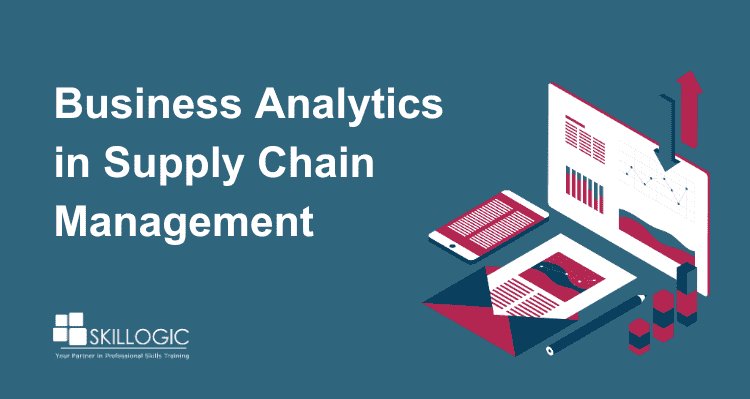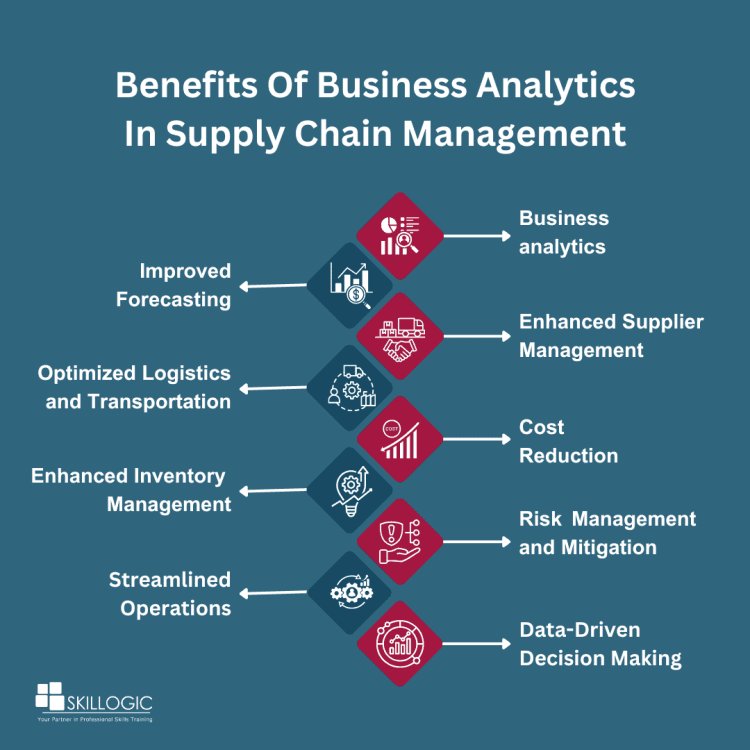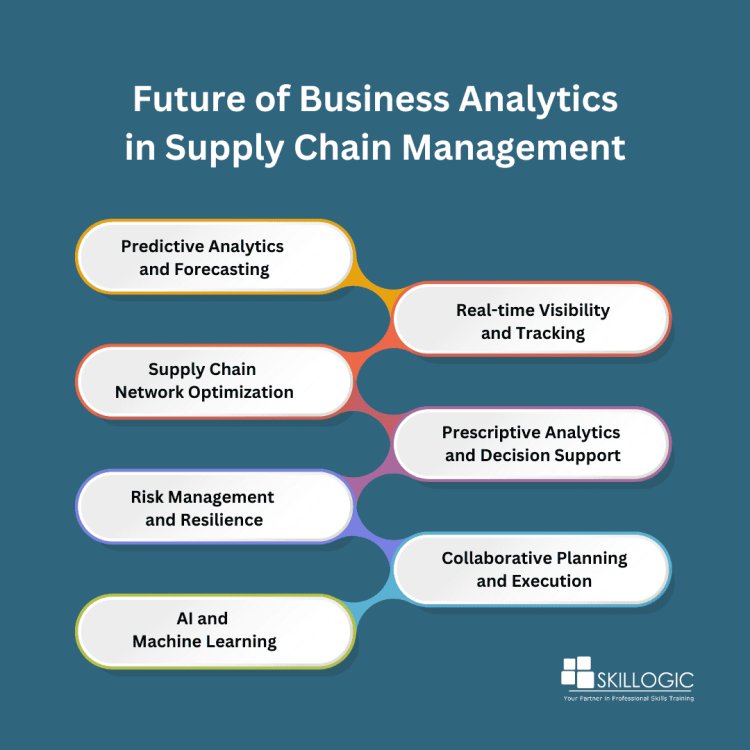Business Analytics in Supply Chain Management
Business analytics in supply chain management leverages data-driven insights to optimize processes, reduce costs, and improve decision-making. It enhances visibility, efficiency, and responsiveness across the supply chain network.

In the ever-evolving landscape of modern business, companies are continually seeking strategies to enhance their competitiveness, streamline operations, and optimize resources. Among the array of tools and methodologies available, business analytics stands out as a powerful enabler, particularly in the realm of supply chain management.
A report from Allied Market Research indicates that the global business analytics market was valued at $225.3 billion in 2023 and is expected to grow significantly, reaching an estimated $665.7 billion by 2033. This growth trajectory suggests a compound annual growth rate (CAGR) of 11.6% from 2024 to 2033.
By harnessing the vast volumes of data generated across the supply chain, businesses can derive valuable insights to drive informed decision-making, improve efficiency, and ultimately boost profitability.
Understanding Supply Chain Management
Supply chain management (SCM) encompasses the coordination of activities involved in the production, procurement, and distribution of goods and services from suppliers to customers. It involves a complex network of interconnected entities, including suppliers, manufacturers, distributors, retailers, and customers.
In 2021, the worldwide supply chain management (SCM) market reached a valuation of USD 27.13 billion. Forecasts indicate a projected compound annual growth rate (CAGR) of 9.4% throughout the forecast period according to a Polaris Market Research report..
The primary goal of SCM is to ensure the timely delivery of products or services while minimizing costs and maximizing customer satisfaction.
Refer these articles:
- Strategic HR Decision-Making Through Business Analytics
- Business Analytics in Marketing
- Comparing Business Analysts and Business Analytics Specialists
Significance of Business Analytics in Supply Chain Management
Business analytics is essential for effective supply chain management, offering valuable insights and optimization prospects across every stage of the process. By analyzing data, businesses can improve demand forecasting, optimize inventory, streamline logistics, and pinpoint inefficiencies in their supply chains. This leads to enhanced operational efficiency, cost reduction, and improved customer satisfaction through timely deliveries, ultimately fostering a competitive advantage.
Based on a Maximize Market Research report, the Business Analytics Market was valued at around US$ 78.48 billion in 2022. It is expected to witness a 7.5% annual growth from 2023 to 2029, culminating in total revenue of nearly US$ 130.21 billion.
Leveraging business analytics in supply chain management enables organizations to swiftly adapt to market changes, manage risks, and seize emerging opportunities, thus contributing to overall business success.
The Role of Business Analytics
Business analytics involves the use of statistical analysis, predictive modeling, and data mining techniques to uncover meaningful patterns and trends within data sets. When applied to supply chain management, business analytics offers several key benefits:
- Demand Forecasting: By analyzing historical sales data, market trends, and external factors such as economic indicators and consumer behavior, businesses can develop accurate demand forecasts. This enables more precise inventory management, reducing the risk of stockouts or excess inventory.
- Inventory Optimization: Business analytics can optimize inventory levels by identifying patterns in demand, lead times, and supplier performance. This ensures that inventory levels are aligned with customer demand while minimizing carrying costs and obsolescence.
- Supplier Performance Management: Analyzing supplier performance metrics such as delivery times, quality, and costs allows businesses to identify top-performing suppliers and negotiate more favorable terms. It also aids in reducing the risks tied to disruptions within the supply chain.
- Transportation and Logistics Optimization: By analyzing transportation routes, mode selection, and carrier performance data, businesses can optimize logistics operations to minimize transit times and transportation costs. This includes route optimization, load consolidation, and real-time tracking capabilities.
- Predictive Maintenance: For companies with physical assets such as manufacturing equipment or vehicles, predictive maintenance analytics can forecast equipment failures before they occur. This forward-thinking strategy cuts down on downtime, lowers maintenance expenses, and enhances overall operational performance.

Key Benefits Of Using Business Analytics In Supply Chain Management
Business analytics is vital for maximizing efficiency in supply chain management, offering valuable insights and enabling well-informed decision-making. Here are some key benefits of using business analytics in supply chain management:
- Improved Forecasting: Business analytics helps in analyzing historical data, market trends, and demand patterns to generate accurate forecasts. This enables businesses to anticipate demand fluctuations and plan their inventory levels, procurement, and production accordingly, reducing stockouts and excess inventory.
- Enhanced Inventory Management: By leveraging analytics, businesses can optimize inventory levels, minimize carrying costs, and ensure adequate stock availability. Analyzing inventory data helps in identifying slow-moving or obsolete stock, optimizing reorder points, and implementing efficient replenishment strategies.
- Optimized Logistics and Transportation: Business analytics enables businesses to optimize logistics and transportation operations by analyzing route efficiency, carrier performance, and transportation costs. This leads to improved delivery schedules, reduced lead times, and lower transportation expenses.
- Cost Reduction: By identifying inefficiencies, redundancies, and cost drivers within the supply chain, businesses can implement cost-saving measures effectively. Analytics helps in identifying areas for process improvement, renegotiating supplier contracts, and optimizing resource allocation, resulting in overall cost reduction.
- Enhanced Supplier Management: Analyzing supplier performance metrics and historical data helps in identifying reliable suppliers, evaluating their performance, and mitigating risks associated with supply chain disruptions. This enables businesses to build stronger supplier relationships, negotiate better terms, and ensure continuity of supply.
- Risk Management and Mitigation: Business analytics enables businesses to identify and assess various risks within the supply chain, such as demand variability, supplier reliability, geopolitical instability, or natural disasters. By proactively identifying risks and implementing mitigation strategies, businesses can minimize the impact of disruptions and ensure business continuity.
- Streamlined Operations: Analytics helps in optimizing various supply chain processes, such as order management, warehousing, and distribution, by identifying bottlenecks, inefficiencies, and areas for improvement. This leads to streamlined operations, reduced cycle times, and improved overall efficiency.
- Data-Driven Decision Making: Business analytics provides actionable insights based on real-time data, enabling stakeholders to make informed decisions quickly. By leveraging analytics tools and technologies, businesses can monitor key performance indicators (KPIs), track performance metrics, and continuously improve supply chain processes.
Refer these articles:
- Who is a Business Analyst
- How to become a Business Analyst in India
- Business Analytics Scope in India
What Changes Business Analytics can bring in Supply Chain Management
Business analytics can bring significant changes to supply chain management by providing insights and enabling data-driven decision-making. Business analyst course training equips professionals with the skills to effectively analyze data, identify trends, and develop actionable strategies. Here are some key ways in which business analytics, supported by business analyst training, can impact supply chain management:
- Demand Forecasting: By analyzing historical data and market trends, businesses can use analytics to improve demand forecasting accuracy. This helps in optimizing inventory levels, reducing stockouts, and minimizing excess inventory, thus improving overall supply chain efficiency.
- Optimized Inventory Management: Business analytics can help in determining the optimal inventory levels across the supply chain network. By analyzing factors such as lead times, demand variability, and supplier performance, organizations can minimize holding costs while ensuring product availability.
- Supplier Performance Management: Analyzing supplier data can provide insights into supplier performance in terms of quality, reliability, and responsiveness. This enables businesses to identify and address issues proactively, optimize supplier relationships, and ensure a more reliable supply chain.
- Route Optimization: Analytics can be used to optimize transportation routes and modes based on factors such as cost, transit time, and capacity constraints. This helps in reducing transportation costs, improving delivery times, and minimizing carbon footprint.
- Risk Management: By analyzing various risk factors such as geopolitical instability, natural disasters, and supplier financial health, businesses can assess and mitigate risks within their supply chains. Predictive analytics can also help in identifying potential disruptions and implementing contingency plans.
- Process Optimization: Business analytics can identify inefficiencies in supply chain processes and suggest optimization opportunities. Whether it's streamlining order processing, warehouse operations, or production scheduling, data-driven insights can lead to cost savings and improved productivity.
- Customer Insights: Analyzing customer data and behavior can provide valuable insights into preferences, buying patterns, and demand variability. This information can be used to tailor products and services, improve customer satisfaction, and enhance overall supply chain performance.
- Sustainability and CSR: Business analytics can help organizations track and measure sustainability metrics across the supply chain, such as carbon emissions, energy consumption, and waste generation. By identifying areas for improvement, businesses can work towards sustainability goals and meet corporate social responsibility (CSR) commitments.

The Future of Business Analytics in Supply Chain Management
The future of Business Analytics in Supply Chain Management is poised to be transformative, driven by advancements in technology, data analytics, and a shifting business landscape. Several crucial factors are influencing its future trajectory.
- Predictive Analytics and Forecasting: Businesses are increasingly leveraging predictive analytics to anticipate demand fluctuations, optimize inventory levels, and plan production more efficiently. Advanced forecasting models powered by machine learning algorithms enable companies to adapt quickly to changes in consumer behavior, market trends, and external factors such as weather patterns or geopolitical events.
- Real-time Visibility and Tracking: Real-time data analytics provide end-to-end visibility across the entire supply chain, enabling stakeholders to monitor inventory levels, track shipments, and identify potential bottlenecks or disruptions in real-time. Technologies such as IoT sensors, RFID tags, and blockchain facilitate the collection of data at various touchpoints, enhancing transparency and enabling proactive decision-making.
- Supply Chain Network Optimization: Business analytics tools are increasingly being used to optimize supply chain networks by analyzing factors such as transportation costs, supplier performance, lead times, and inventory carrying costs. By modeling different scenarios and conducting "what-if" analyses, organizations can identify opportunities to streamline operations, reduce costs, and enhance overall efficiency.
- Prescriptive Analytics and Decision Support: Prescriptive analytics goes beyond descriptive and predictive analytics by recommending optimal courses of action to improve supply chain performance. By combining data-driven insights with business rules and optimization algorithms, organizations can make informed decisions regarding inventory management, production scheduling, supplier selection, and distribution strategies.
- Risk Management and Resilience: With supply chains becoming increasingly complex and interconnected, businesses face growing risks from disruptions such as natural disasters, geopolitical instability, supplier bankruptcies, or cyber-attacks. Business analytics can help organizations assess and mitigate these risks by identifying vulnerabilities, developing contingency plans, and enhancing supply chain resilience.
- AI and Machine Learning: Artificial intelligence and machine learning technologies are playing a pivotal role in driving innovation in supply chain analytics. These technologies enable automated data analysis, pattern recognition, and decision-making, empowering organizations to uncover actionable insights from vast amounts of structured and unstructured data.
- Collaborative Planning and Execution: Collaboration across supply chain partners is essential for achieving agility and responsiveness in today's dynamic business environment. Business analytics platforms facilitate collaborative planning and execution by providing a centralized platform for sharing data, coordinating activities, and aligning goals across multiple stakeholders.
In an increasingly competitive business environment, the effective management of the supply chain is paramount to success. By leveraging the power of business analytics, companies can gain a deeper understanding of their supply chain dynamics, identify areas for improvement, and make data-driven decisions that drive efficiency and profitability. To enhance these capabilities, business analyst training is essential, equipping professionals with the skills needed to analyze complex data sets and apply analytical techniques effectively. As technology continues to advance and data volumes grow, the role of business analytics in supply chain management will only become more critical in shaping the future of business operations.
For those seeking to advance their skills and excel in Business Analysis, SKILLOGIC Institute is a top choice. As a premier provider of certification training in PMP, PRINCE2, Six Sigma, DevOps, cybersecurity, and business analytics, SKILLOGIC offers accredited programs recognized by IABAC. Our extensive training includes targeted courses like Business Analytics for Managers, Business Analytics for Marketing, and Business Analytics for HR Professionals. With industry-recognized certifications, SKILLOGIC equips aspiring Business Analysts with the essential knowledge and expertise to thrive in today’s competitive environment.
SKILLOGIC Training Institute provides expert-led certification programs in Six Sigma, PMP, Cybersecurity, and Business Analytics. With over ten years of experience, it offers practical, career-oriented training. SKILLOGIC has offline centers in key Indian cities, making high-quality education accessible to help individuals enhance their skills and boost their career growth.

0
446